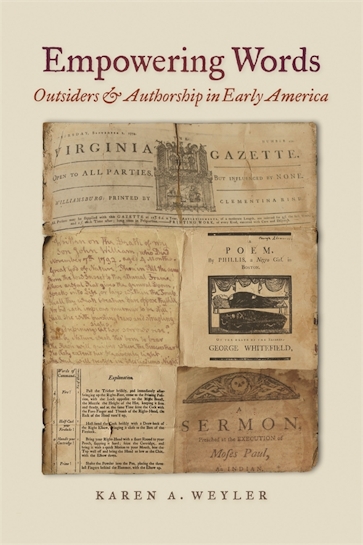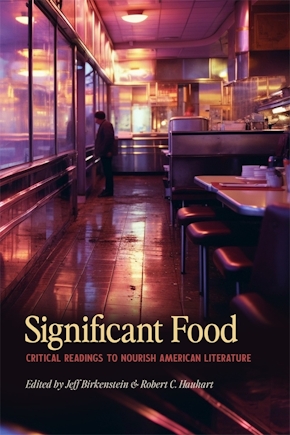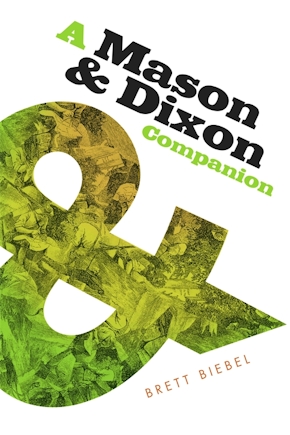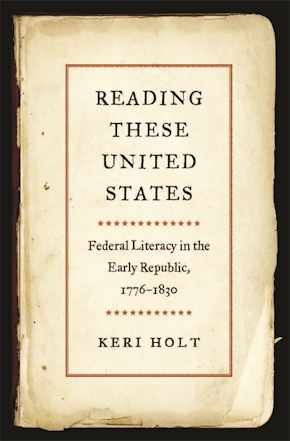Empowering Words
Outsiders and Authorship in Early America
Title Details
Pages: 328
Illustrations: 18 b&w photos
Trim size: 6.000in x 9.000in
Formats
Paperback
Pub Date: 04/01/2013
ISBN: 9-780-8203-4324-2
List Price: $36.95
Hardcover
Pub Date: 04/01/2013
ISBN: 9-780-8203-4323-5
List Price: $120.95
eBook
Pub Date: 04/01/2013
ISBN: 9-780-8203-4325-9
List Price: $36.95
Related Subjects
Empowering Words
Outsiders and Authorship in Early America
Skip to
- Description
- Reviews
- Awards
Standing outside elite or even middling circles, outsiders who were marginalized by limitations on their freedom and their need to labor for a living had a unique grasp on the profoundly social nature of print and its power to influence public opinion. In Empowering Words, Karen A. Weyler explores how outsiders used ephemeral formats such as broadsides, pamphlets, and newspapers to publish poetry, captivity narratives, formal addresses, and other genres with wide appeal in early America.
To gain access to print, outsiders collaborated with amanuenses and editors, inserted their stories into popular genres and cheap media, tapped into existing social and religious networks, and sought sponsors and patrons. They wrote individually, collaboratively, and even corporately, but writing for them was almost always an act of connection. Disparate levels of literacy did not necessarily entail subordination on the part of the lessliterate collaborator. Even the minimally literate and the illiterate understood the potential for print to be life changing, and outsiders shrewdly employed strategies to assert themselves within collaborative dynamics.
Empowering Words covers an array of outsiders including artisans; the minimally literate; the poor, indentured, or enslaved; and racial minorities. By focusing not only on New England, the traditional stronghold of early American literacy, but also on southern towns such as Williamsburg and Charleston, Weyler limns a more expansive map of early American authorship.
Ranging in coverage from the canonical Phillis Wheatley to now-obscure artisans, Weyler demonstrates the many ways nonelite authors gained access to print to create public identities at the end of the eighteenth and the beginning of the nineteenth centuries. Empowering Words compels us to expand our definitions of agency, authorship, literacy, and literature to encompass the unlikely men and women who populated the world of print in early America.
—Vincent Carretta, author of Phillis Wheatley: Biography of a Genius in Bondage
Weyler's book delves deeply into literary and cultural studies as these intersect with the study of scribal and print history-all in an effort to uncover the methods used by cultural outsiders to access the literary cultural marketplace and find multiple audiences for their work. Her study provides us a fascinating glimpse of the cultural negotiations and renegotiations taking place during the eras of the American Revolution and the early Republic.
—Carla Mulford, founding president of the Society of Early Americanists
Using an innovative and persuasive approach, as well as much new material, Empowering Words reveals that slaves, women, and other marginalized groups shrewdly manipulated mainstream culture and not only wrote but published themselves into being during the early national period. The book will be an invaluable resource for scholars interested in class, gender, identity, race, and print culture.
—Kathryn Zabelle Derounian-Stodola, author of The War in Words: Reading the Dakota Conflict through the Captivity Literature
—Philipp Schweighauser, American Studies
Winner
Outstanding Academic Title, Choice magazine



